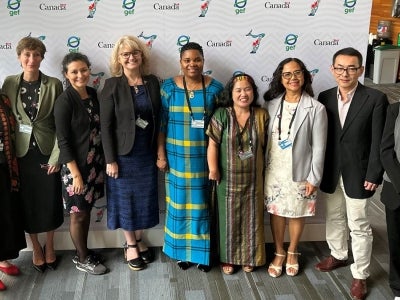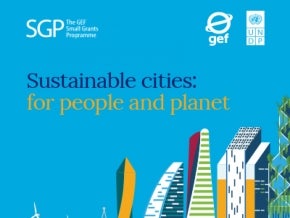
Life can be hard in The Gambia – and even harder for the women who harvest oysters, a local delicacy and key source of protein, in the West African country’s swamps and wetlands.
It’s back-breaking work, venturing out in small canoes to harvest oysters from amongst the mangrove roots using machetes and other rudimentary tools – at the mercy of clouds of mosquitoes, crocodiles and the razor-sharp edges of the oyster beds themselves.
Poor and typically illiterate, these women are often the only breadwinners for their families, selling their catch by the roadside for a meagre return, marginalised by their position and their poverty.
But the will for change and the backing of the Global Environment Facility's Small Grants Programme, implemented by the United Nations Development Programme, is turning the tide for one group of Gambian women.
“I pulled up one day to buy some oysters from a roadside seller. I asked her how things were going and she started telling me her story. Soon other oyster sellers gathered around and began to chime in with their own experiences," TRY Oyster Women’s Association founder Fatou Janha says. “From this meeting, I took away one simple message: women were ready for a change."
Starting with a group of 40 women from one community and $14,000 from the Small Grants Programme, TRY has now grown to include 600 oyster harvesters from all over the country. “Our organization has one simple goal. We want to improve both the natural resources we depend on and the social and economic conditions of our members – and through self-empowerment rather than aid or charity,” Fatou says.
A $14,000 grant may be a small investment in the context of international development, but as TRY has shown, at the grassroots level it has the potential to make a life-changing difference to communities’ well-being, their environment and their long-term futures.
“With those limited resources we were able to start a journey and make many meaningful changes,” Fatou says.
The Association has so far helped to re-orient government policy by lobbying for, and ultimately securing, official and exclusive rights to manage and sell the products of the fishery they harvest in the Ramsar wetlands. For the first time, this is allowing The Gambia’s oyster harvesters to make their own decisions about how to best safeguard their environment and their future. The Association has improved the physical environment and now has formal ecosystem management plans in place that involve replanting the mangroves every year and protecting them from further degradation. But the changes don’t stop there, through supply-chain development, a microfinance programme and financial training, TRY is building the foundations for its members’ long-term financial security. Meanwhile, providing access to health-related information and services for Association members is securing their ability to keep profiting into the future.
“We transformed our local micro-economy by increasing the price of oysters to a level that enables the harvesters to earn a decent living,” Fatou says. “The price is now fair and sustainable and our women understand the economic power of cooperation. We have revolutionized the way they manage their money; for the first time, the women have access to a bank account where they can deposit their earnings. And we have completely changed the way women manage their health by arranging for them to attend regular health clinics, because – without healthy people, you cannot have a healthy environment.”
The TRY Oyster Women’s Association was awarded the United Nations Development Programme’s Equator Prize in recognition of outstanding community efforts to reduce poverty through the conservation and sustainable use of biodiversity in 2012.
This article originally appeared in "The Global Environment Facility: Delivering solutions for a sustainable future," the September 2017 issue of UN Environment's "Our Planet" magazine. The magazine was launched at the GEF-7 2nd replenishment meeting in Addis Ababa, Ethiopia.


